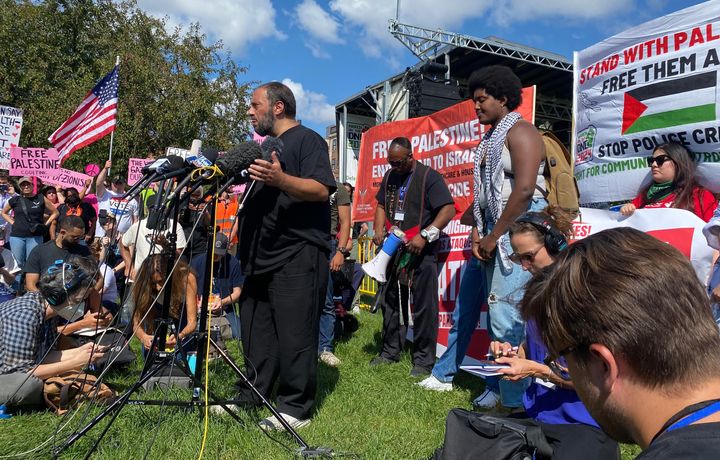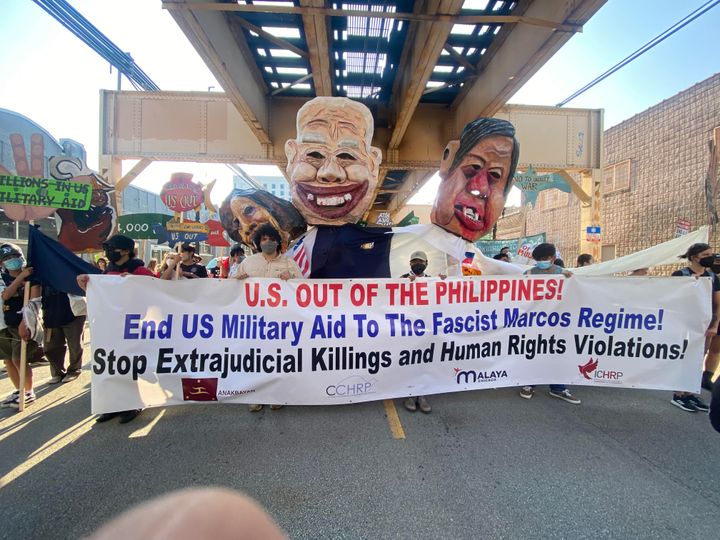CHICAGO ― While much of the country braced for the chaos that is the Democratic National Convention this week, Americans from all walks of life who felt disillusioned by the party’s continued support for Israel’s deadly military campaign in Gaza prepared to make their voices heard within sight and sound of the convention.
On Monday morning, organizers, protesters and media began filling Chicago’s Union Park, where the long-awaited March on the DNC was to take place. Organizers and volunteers handed out items like water bottles, snacks and picket signs, while protesters donning keffiyehs ― the patterned fabric symbolizing Palestinian liberation ― arrived either individually, with friends or as part of a more official group.
Before the actual march toward the United Center, where the DNC was holding its evening programming, the organizing coalition held a rally at the park featuring a long list of speakers who hyped up the crowd with chants of freedom and demands that the Democratic Party, the Biden administration and the Kamala Harris and Tim Walz ticket take action to secure a permanent cease-fire in Gaza and a U.S. arms embargo on Israel, among other progressive issues.

“We’re out here today from all across this country to make it clear that we say genocide is not welcome here. We make it clear that we will not be casting any ballots for anybody who oversees the genocide, the indiscriminate murder of Palestinian children, families and futures,” Sarah Mahmoud of the National Alliance Against Racist and Political Repression (NAARPR) told the crowd.
“We know Palestine will be liberated in our lifetime, and it’s because Palestine is a struggle for justice for all people,” she continued. “It’s a struggle that connects all of our shared oppression towards our shared liberation.”
Protesters from Chicago and across the country belonged to several communities, many of which are marginalized. Speakers at the rally stressed that the issue of Palestinian freedom is just as important in the fight to protect Black, Latino, Asian, Indigenous, disabled, queer and immigrant communities.
“That’s what the DNC is concerned about. They’re concerned about the thousands that are going to be here all week, maybe tens of thousands,” Hatem Abudayyeh, co-chair of the U.S. Palestinian Community Network, told reporters before the rally. “They’re concerned about the unity, especially the Black-Palestinian solidarity that we’ve built in this city and in this country ― a powerful movement in which Palestinian people are supporting the movement against police crimes across the country, and the movement against police crimes is supporting Palestinian self-determination.”
“All these other communities and all these other nationalities and all these other religions and age groups are here to say the same thing: that this is the Vietnam War of our generation,” he said, calling back to the 1968 DNC in Chicago, where crowds of Americans protesting the Vietnam War faced deadly police brutality.

One year later, the Black Panther Party’s chairman in Chicago, Fred Hampton, created the Rainbow Coalition ― a model of anti-racist solidarity that brought marginalized groups together to unite behind the same issues because of the common enemy that is systemic oppression. Hampton’s alliances with the Young Lords and the Young Patriots turned into a massive leftist coalition that backed each other at protests and strikes.
That year, Hampton was assassinated at his Chicago home in what is now widely known to have been directed by the FBI.
“My homies came back traumatized or dead from Vietnam, and it radicalized me. That’s why today we’re in solidarity with the Palestinian people,” Chicano leader Carlos Montes said from the rally stage. “We support working-class power, Black power, and we are going to have a revolution in this country.”
Monday’s rally and march were largely fiery but safe, with the exception of some confrontations between Chicago police and a small group of people (who were not among the march’s organizers) trying to break through the first DNC security perimeter, as well as a small group of of pro-Israel counterprotesters.
The rally appeared to have had a few thousand attendees, and the crowd grew significantly as the march gathered momentum. Abudayyeh said that he estimated 15,000 demonstrators joined the event, a smaller number than organizers anticipated but nevertheless a large presence that they expect to be even larger when they’re back at Union Park on Thursday evening, the final day of the convention.
Disclaimer: The copyright of this article belongs to the original author. Reposting this article is solely for the purpose of information dissemination and does not constitute any investment advice. If there is any infringement, please contact us immediately. We will make corrections or deletions as necessary. Thank you.
